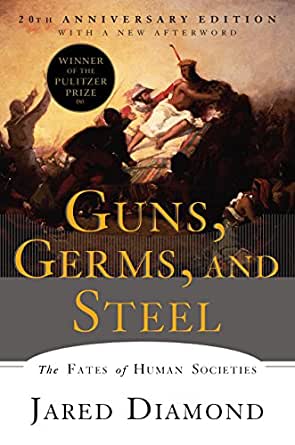Book Review: Guns, Germs, and Steel
Published:
Jared Diamond’s Guns, Germs, and Steel is an interdisciplinary deep dive into the trajectories of human societies. He explores thousands of years of history using an variety of methodologies to answer a basic question: why are some societies more successful than others? The answer, he argues, is geographical determinism.

Here’s the audiobook and paperback.
Utility: ⭐⭐⭐⭐ (4/5)
Writing: ⭐⭐⭐⭐ (4/5)
Diamond’s writing style is precise and entertaining. He takes the reader along an intellectual journey, considering and evaluating historical hypotheses. The book is replete with helpful diagrams and pictures, putting a face on the societies discussed in the text. At some points, the examples become a little repetitive and boring, but if you’re genuinely interested in history, the breadth will be a plus.
Personally, I tend to find history dry. This book has done much to change my mind. I find the content to be a useful way to understand the state of societies today. It also thoroughly discredits “great men history” and the thesis of white supremacy.
Notes
As a historical survey, taking detailed notes would be impractical. So, here are five main points of the book:
- Differences in agriculture. Agriculture arose in Mesopotamia where desperate hunter-gatherers learned how to plant crops and domestic animals through trial and error. Some regions had natural advantages in the forms of soil fertility, suitable large animals for domestication, and edible native crops. Eurasia adopted agriculture more rapidly because climates are similar along the east-west axis, which in turn limited diffusion in America and Africa.
- Agriculture enables guns, germs, and steel. Agrarian societies were denser and had greater contact with animals, breeding the circulation of epidemics. A greater need for record keeping and an abundance of leisure time spurred the invention of written language. These small agrarian societies scaled from bands to tribes and ultimately to states.
- The theory works. Geographical determinism accounts for why the New Guineans developed complex societies while Australian aboriginals didn’t. A suiting climate and geography explain why centralized governments appeared in China. A poor environment explains why sub-Saharan Africa failed to develop complex technologies.
- It’s not everything, but… Many individuals—Hitler, Alexander the Great, Julius Caesar—certainly charted the path of history. In fact, geography doesn’t do much to explain everyday actions or immediate events. But what geography does do is shape the broad trajectories of history: which societies will adopt agriculture, which ones will innovate, which ones will reign supreme.
- Scientize history. The book deploys a variety of methodologies—from carbon-dating artifacts to linguistic analysis—to piece together events. It uses objective features, such as population density, biological diversity, or land mass, to support theories. Although history differs from other scientific disciplines in data collection and interpretation, it benefits equally from the rigor of scientific analysis.
